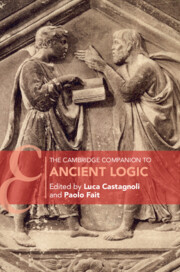Book contents
- The Cambridge Companion to Ancient Logic
- Other Volumes in the Series of Cambridge Companions
- The Cambridge Companion to Ancient Logic
- Copyright page
- Contents
- Contributors
- Introduction
- I The Development of Logic in Antiquity
- II Key Themes
- III The Legacy of Ancient Logic
- 14 Ancient Logic in the Middle Ages
- 15 Ancient Logic from the Renaissance to the Birth of Mathematical Logic
- 16 Ancient Logic Today
- Bibliography
- Abbreviations
- Index of Passages
- General Index
- Other Volumes in the Series of Cambridge Companions
14 - Ancient Logic in the Middle Ages
from III - The Legacy of Ancient Logic
Published online by Cambridge University Press: 29 April 2023
- The Cambridge Companion to Ancient Logic
- Other Volumes in the Series of Cambridge Companions
- The Cambridge Companion to Ancient Logic
- Copyright page
- Contents
- Contributors
- Introduction
- I The Development of Logic in Antiquity
- II Key Themes
- III The Legacy of Ancient Logic
- 14 Ancient Logic in the Middle Ages
- 15 Ancient Logic from the Renaissance to the Birth of Mathematical Logic
- 16 Ancient Logic Today
- Bibliography
- Abbreviations
- Index of Passages
- General Index
- Other Volumes in the Series of Cambridge Companions
Summary
Aristotelian logic was the basis for various traditions of medieval logic: Greek, Armenian, Syriac, Latin, Arabic, and Hebrew. This chapter will concentrate on just two, the Latin and the Arabic. They are certainly the two great traditions of logic in the Middle Ages and the very different ways in which they use the ancient heritage makes a fascinating comparison. A fuller discussion would certainly include the other four traditions: they are omitted here, not just due to considerations of space, but also because scholarship in these areas has not yet reached the stage to make a survey possible.
- Type
- Chapter
- Information
- The Cambridge Companion to Ancient Logic , pp. 301 - 318Publisher: Cambridge University PressPrint publication year: 2023

